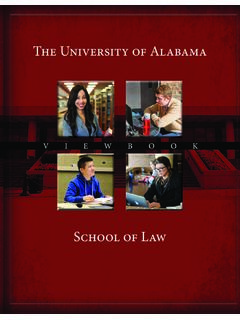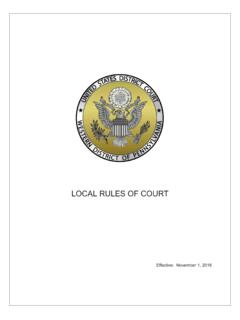Transcription of The Attorney's Duty to the Court Against Concealment ...
1 The Attorney's Duty to the Court Against Concealment , Nondisclosure and Suppression of information as Coextensive with the Duty Not To Allow Fraud To Be Committed upon the Court The extent to which it is regarded as counsel's duty to advise the Court as to matters relevant to the proper decision of the case of which opposing counsel is ignorant or which he has overlooked turns on the degree to which the old idea that litigation is a game between the lawyers has been supplanted by the more modern view that the lawyer is a minister of justice. H. Drinker, Legal Ethics 76 (1953). A case dealing with the failure of an attorney to advise the Court of a matter which was relevant to a proper decision is Sullins u. State Bar.' A testatrix had disinherited her daughter and left her whole estate to her nephew.
2 The daughter began an action to contest the will. Sullins, who had been the attorney for the conservator of the testatrix before her death, represented the executor of the In this capacity, Sullins wrote to the nephew telling him of his position as sole beneficiary and that the daughter was contesting the will. The nephew immediately replied in a notarized letter, express- ing his desire not to receive anything under the will and that the property should be the daughter's without her having to contest the will. Sullins did not acknowledge this letter nor did he disclose its receipt or the information contained therein to the daughter or to the Court , which had before it the probate of the estate and the will contest. Three years later, still without having disclosed the letter, Sullins obtained from the Court a 50% contingency fee, replacing a 33 113% agreement that had been in effect.
3 In the petition for the new agreement; Sullins stated that the 33 113% fee was not ade- quate "because the civil action had been and would continue to be 1. 15 Cal. 3d 609, 542 631, 125 Cal. Rptr. 471 (1975), cert. denied, 425 937 (1976). 2. As attorney for conservator, Sullins had handled an action to set aside a conveyance by the testatrix of real estate, making up the bulk of the estate, to the disinherited daughter and herself as joint tenants because of lack of delivery. A default judgment Against the daughter was obtained, but she secured permission to file an answer. 200 The Journal of the Legal Profession fiercely ~ontested."~ The daughter's attorney requested that the nephew come to California for the taking of depositions before trial.
4 At these depositions, the nephew revealed the correspondence be- tween himself and Sullins. As a result of this information , the daughter obtained the removal of the administrator and Sullins from the handling of the estate. The Court found that fraud upon the Court and the estate had been committed when the petition for the increased fee was presented for the Court 's approval while the letter from the nephew was kept secret. An administrative commit- tee of the State Bar found that Sullins had not carried out the oath and duties required of an attorney, citing several sections of the Business and Professions C~de.~ The disciplinary board decided to reprove Sullins publicly rather than suspend him for ninety days as had been suggested by the administrative committee.
5 The reasons Sullins gave to justify his actions were, inter alia, that the daugh- ter's attorney had also concealed the letter, that the nephew's letter violated a no-contest clause of the will, or in the alternative, that the nephew's interest could not be assigned, and that as attorney for the estate he owed a duty to its creditors. The Court held that whether the other attorney failed to disclose the contents of the letter had no bearing on the issue of whether Sullins should be disciplined. The contention that the letter violated the no-contest - clause or that the nephew could not assign his interest would be helpful, the Court held, only if Sullins had in good faith believed these were reasons not to disclose the information contained in the letter.
6 There was no evidence that he these were valid reasons for his failure to disclose. According to the Court , the duty to the creditors of the estate was no defense because sections 6068 and 6128 of the Business and Professions Code absolutely pro- hibit an attorney from misleading or deceiving the Court and Sullins admitted the c~ncealment.~ Public reproval was found to have been the appropriate dis~ipline.~ 3. 542 at 634, 125 Cal. Rptr. at 474. 4. In CAL. [BUS. & PROF.] CODE 8 6103 (West 1974), a violation of the oath or duties of an attorney is a cause for discipline. Section 6128 makes it a misdemeanor for an attorney to be a party to any deceit or collusion intended to deceive either the Court or any other party. Section 6106 makes discipline proper for acting in a dishonest manner or with moral turpitude.
7 5. Id. Section 6068 makes it the duty of an attorney "never to seek to mislead the judge or any judicial officer by an artifice or false statement of fact or law." 6. The Court did not decide whether the Court was misled for the Attorney's Concealment , Nondisclosure and Suppression 201 Failures to disclose numerous things to the Court have been held to have been professional misconduct, including association of a juror with the attorney,' property in a bankruptcy pro~eeding,~ facts relevant to possible unreliability of a witnes~,~ prior adjudica- tion,"' settlement of a case," perjury of a witness,12 and adverse case law."' The ABA Code of Professional Responsibility (hereinafter re- ferred to as ABA Code) places upon an attorney a duty not to with- hold from the Court information he has an obligation to There are, however, no clear guidelines for telling an attorney ex- actly what his duty entails.
8 Samuel Williston, while defending on a contract, was faced with the problem of whether or not to disclose a letter to the Court . At Williston's counsel table there was an assembly of correspond- ence between the parties to the suit. The judge found for the defen- dant, stating as one of his reasons, a fact which was shown by one of the letters to be in error. Williston, though feeling uncomfortable, kept quiet. He concluded that it would have been a violation of his duty to his client if he had disclosed the unfavorable evidence. Williston stated that a lawyer, after deciding to represent a client, does not have to and should not inform the Court of information which would be harmful to the cause of his It is generally believed that Williston's action in this situation was It is an overstatement to say that an attorney never has to own gain because the misleading of the Court was itself sufficient reason for the discipline.
9 7. Mississippi Power Co. v. Stribling, 191 Miss. 832, 3 So. 2d 807 (1941). 8. In re Glover, 176 Minn. 519, 223 921 (1929). 9. In re Tepper, 170 App. Div. 889, 154 412 (1915). Seegenerally Note, The Attorney k Duties of Disclosure, 31 ST. JOHN'S L. REV. 283 (1957). 10. People ex rel. Healy v. Case, 241 Ill. 279, 89 638 (1909). 11. State ex rel. Dill v. Martin, 45 Wash. 76, 87 P. 1054 (1906). 12. In re King, 7 Utah 2d 258, 322 1095 (1958). 13. In re Greenberg, 15 132, 104 46 (1954). 14. ABA CODE OF PROFESSIONAL RESPONSIBILITY [hereinafter cited as ABA CODE], Ethical Consideration [hereinafter cited as EC] 7-27 reads in pertinent part as follows: "Because it interferes with the proper administration of justice, a lawyer should not suppress evidence that he or his client has a legal obligation to reveal or produce.
10 " ABA CODE, Disciplinary Rule [hereinafter cited as DR] 7- 102(A)(3) states that while representing a client, a lawyer shall not "conceal or knowingly fail to disclose that which he is required by law to reveal." 15. See S. WILLISTON, LIFE AND LAW 271-72 (1940). 16. Countryman, The Scope of the Lawyer$ Professional Responsibility, 26 OHIO ST. 66, 69 (1965). 202 The Journal of the Legal Profession reveal information which would be harmful or even fatal to a cause he is trying. Although not very helpful, the general rule could be said to be that an attorney, as an officer of the Court , has a duty to inform the Court of anything which it is entitled to be informed It has been held that "the true position of an attorney before the Court is that of an aide and assistant.






